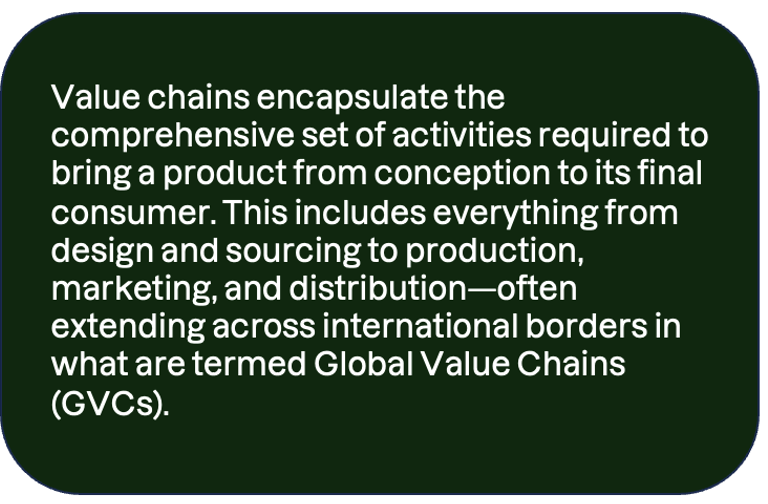Written by Hanna Selvaag Wangsmo, Investment Manager at RunwayFBU
The recent global economic turmoil and political instability have revealed vulnerabilities in our value chains, and brought priorities such as visibility, resilience, and digitalization to the top of the agenda for business leaders worldwide. Looking ahead towards the next decade, we at RunwayFBU believe that technology will be the key enabler for unlocking further potential in global value chains. This transformation holds the potential to unlock unprecedented levels of efficiency, sustainability and resilience in the global trade system, and help accelerate the Net Zero transition.

The pandemic put GVCs in the spotlight. The Global Supply Chain Pressure Index (GSSCPI) spiked to its highest level ever in December 2021, at nearly three times the pre-pandemic record. Overnight, governments shut down borders and imposed lockdown measures that impacted both individuals and businesses. These measures resulted in a sharp mismatch in supply and demand, that still poses significant challenges today. The ongoing shift away from economic globalization, geo-political frictions across the globe, coupled with technological onshoring (as seen in the semiconductor industry), has put additional pressure on global value chains. Some of the more immediate consequences include restricted access to goods and labor, as well as a sustained surge in prices for energy, shipping, food and construction materials – to mention a few.
Role of Software: Enhancing efficiency, sustainability and resilience in the global trade system
The evolution of global value chains over recent decades has been notable, yet we perceive this as only the initial phase. There is ample potential for further productivity gains through improved technology and data utilization, that again can help accelerate the Net Zero transition. We have identified four such ways we believe software and technology can enhance efficiency, sustainability and resilience in the global trade system:
- Increasing transparency & due diligence: According to EY, increasing visibility is the top priority over the next 12-36 months for supply chain executives. AI-powered visibility and control of value chains will enable companies to understand their supply base beyond the components layer, and down to assembly and fabrication. Moreover, software can support planning and estimation, modeling, and disruption monitoring.
- Internet of Things (IoT) and artificial intelligence (AI): The term "Internet of Things" (IoT) was initially coined in 1999, but it's only recently that data rates, geographical coverage, and energy consumption has reached a satisfactory cost/quality trade-off so that its benefits can be realized on a larger scale. Combined with AI, we anticipate that this advancement will unlock new possibilities for use cases such as simulating reality, optimizing execution, and enabling real-time monitoring throughout global value chains.
- Industry 4.0: With the rise of data and connectivity, analytics, human-machine interaction and improvements in robotics, Industry 4.0 is already disrupting value chains globally. Noteworthy applications include predictive maintenance, smart manufacturing, digital twins, and energy management, among others.
- Regulatory & ESG: Beyond technological advancements, the evolving regulatory landscape, and the escalating significance of Environmental, Social, and Governance (ESG) factors have become drivers of innovation within companies. These shifts compel organizations to transform how they monitor, report, and integrate ESG considerations into their operational frameworks.
RunwayFBU: Supporting founders solving important global challenges
At RunwayFBU, we support entrepreneurs building global companies solving important challenges by using data and technology. Our approach is founder-friendly and builds on the strengths of the Aker ecosystem. We enable founders to access the competence, expertise and network found across the different Aker companies and our wider corporate network. With Aker's extensive international reach, RunwayFBU is a unique resource for companies aiming to test transformative ideas for the global value chains.
If your company holds the potential to transform global value chains, please connect with us and let's discuss how we can propel your venture forward!
Examples from RunwayFBU’s Portfolio
- ComplAI: Offers a platform that streamlines compliance across value chains, enhancing cooperation and security among all involved parties.
- Sparkel: Transforms the construction value chain by enabling better decision-making through AI-powered analysis of construction designs.
- TP Accurate: Enhances the financial transfer pricing process, making it faster and more efficient, thus transforming the value chain in the financial sector.
- Torq (formerly LN Capital): Provides scalable node management for Lightning Network, transforming the value chain in blockchain and digital currency sectors.



